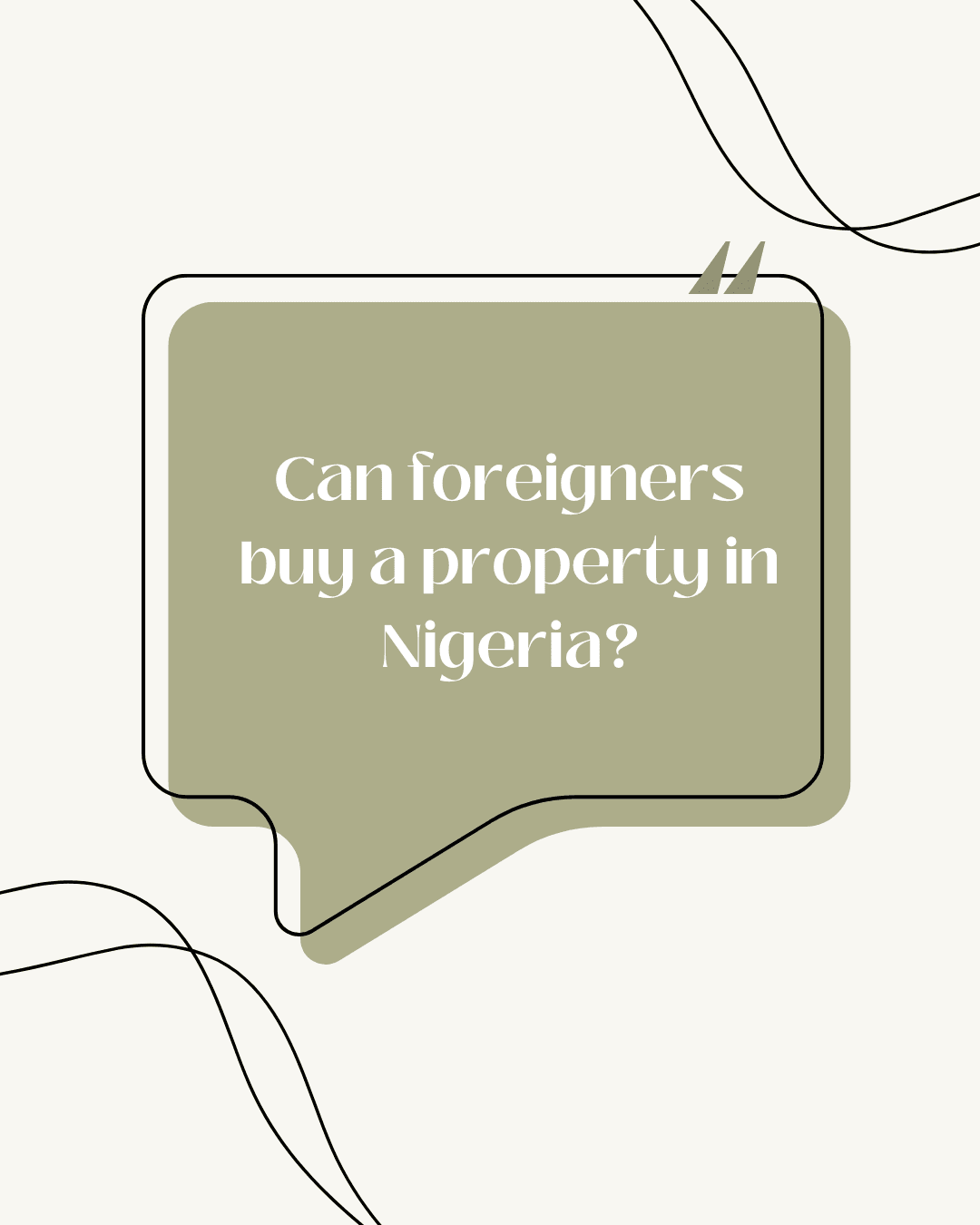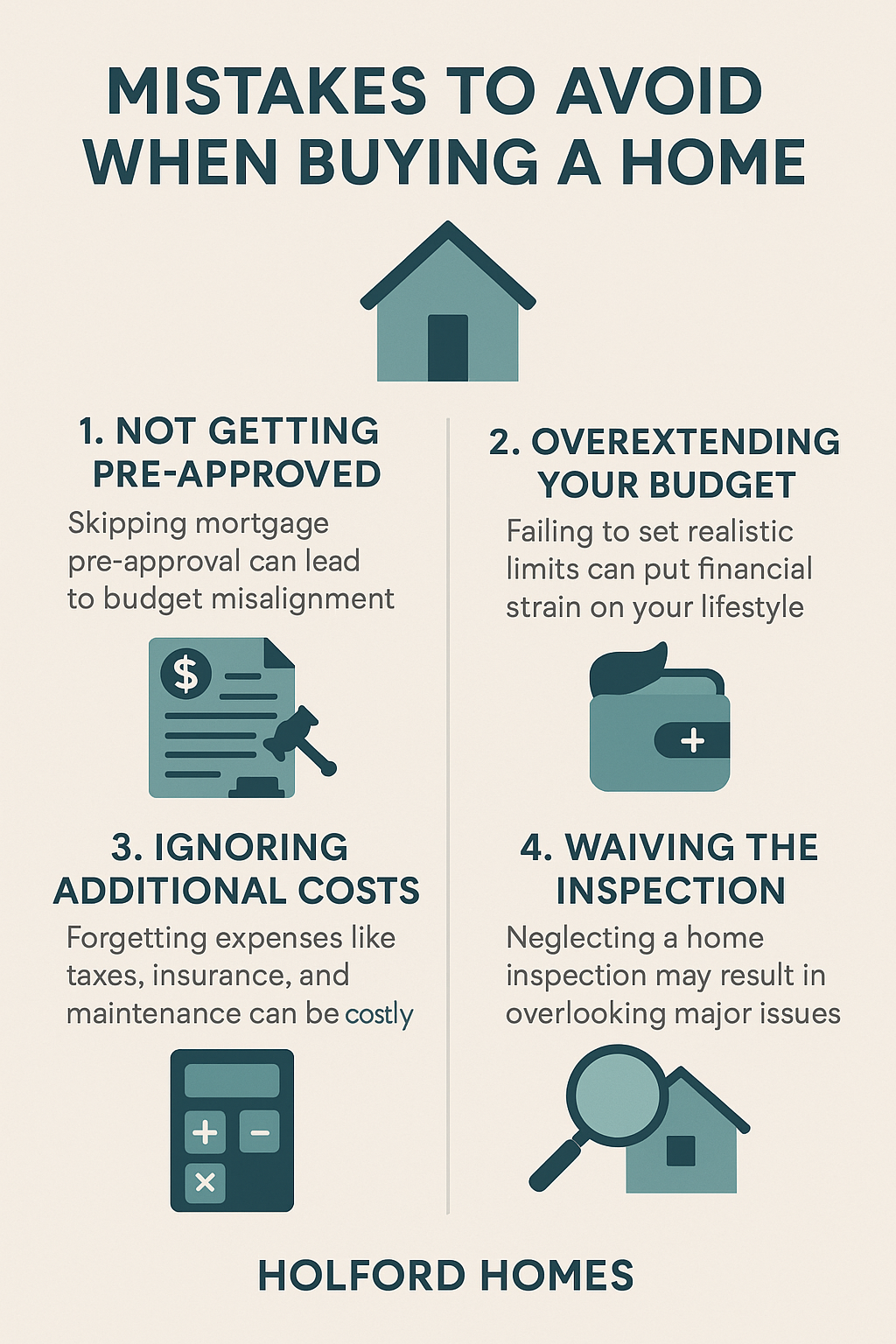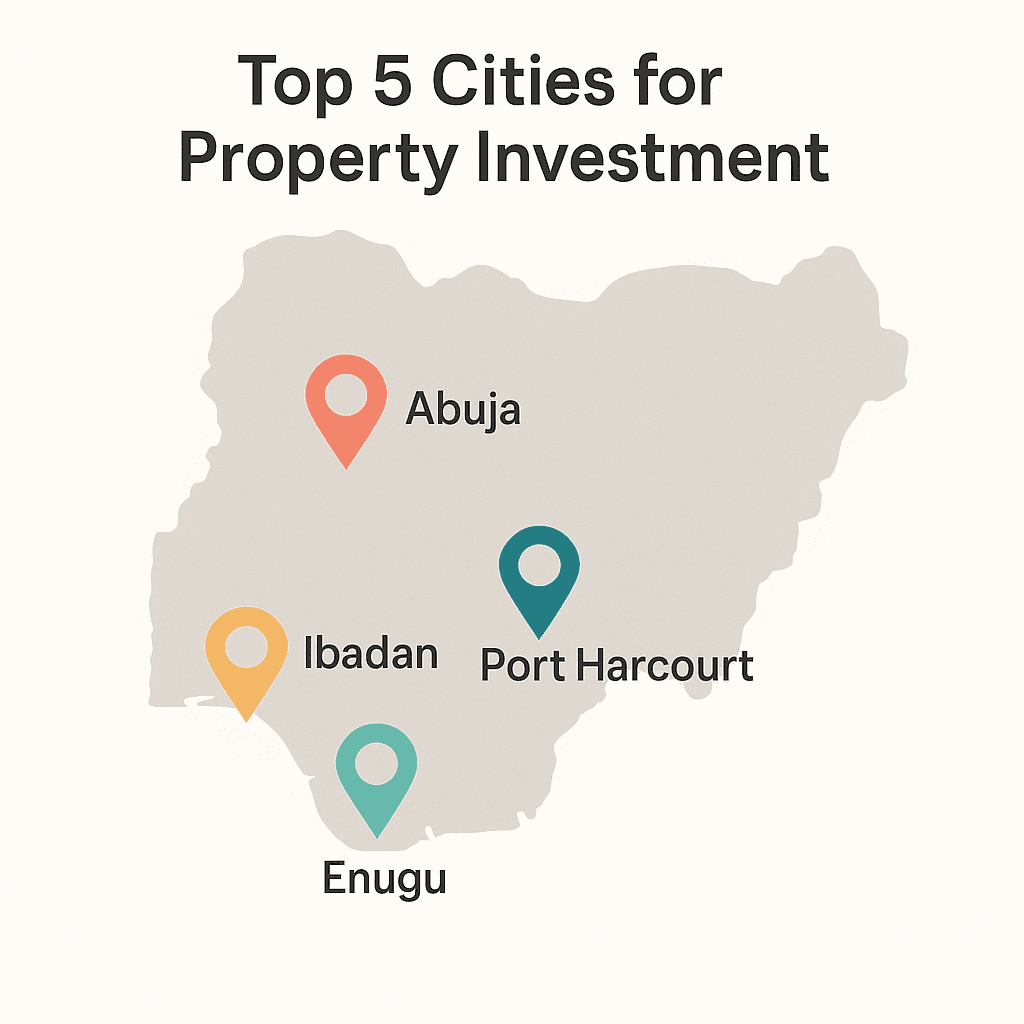Can Foreigners Buy Property in Nigeria?

Find out how foreigners can legally buy property in Nigeria — step-by-step process, taxes, and important legal requirements explained clearly.
Yes — foreigners can legally buy property in Nigeria, but there are specific legal steps and requirements they must follow.
This article breaks down those requirements, taxes, and the entire ownership process for non-Nigerians investing in Nigeria's booming real estate market.
Legal Framework for Foreign Property Ownership
Under the Land Use Act of 1978, all land in Nigeria is owned by the state government, held in trust for the people.
Foreigners are allowed to lease land for up to 99 years through a Certificate of Occupancy (C of O) — not outright ownership.
In essence: foreigners can't own land freehold, but they can own property via long-term leasehold.
Comprehensive Step-by-Step Process for Foreign Buyers
Step 1: Property Search & Selection (1-3 months)
Actions:
- Identify target cities and neighborhoods
- Work with LASRERA-registered real estate agents
- Request property listings with documentation
- Conduct virtual or physical property viewings
- Shortlist 2-3 properties for detailed investigation
Due Diligence:
- Verify property location (not in government acquisition zones)
- Check existing structures match listings
- Assess neighborhood security and amenities
- Review estate regulations (if applicable)
Step 2: Legal Verification (1-2 months)
Hire a Nigerian Property Lawyer:
- Must be licensed by Nigerian Bar Association (NBA)
- Preferably with experience in foreign transactions
- Fee: ₦300,000-1,000,000 (0.5-1% of property value)
Lawyer Conducts:
- Title search at State Land Registry
- Verification of Certificate of Occupancy (C of O)
- Survey plan authentication
- Search for existing liens or encumbrances
- Confirmation of seller's ownership rights
- Check for any pending litigation
Step 3: Negotiation & Agreement (2-4 weeks)
Negotiate Terms:
- Property price (10-15% negotiation room typical)
- Payment schedule (installments or lump sum)
- Timeline for ownership transfer
- Responsibility for fees and taxes
Sign Agreement of Sale:
- Lawyer reviews all terms
- Both parties sign
- Pay initial deposit (typically 20-30%)
- Agreement registered with lawyer
Step 4: Obtain Governor's Consent (2-6 months)
Why It's Required:
Land Use Act of 1978 requires Governor's approval for all land transfers, especially to foreigners.
Application Process:
- Submit application to State Ministry of Lands
- Provide: Property documents, buyer ID, seller consent, survey plan
- Pay Governor's Consent fee (1.5-3% of property value)
- Wait for approval (varies by state: Lagos 3-6 months, Abuja 2-4 months)
Cost: ₦500,000-1,500,000+ depending on property value and state
Step 5: Payment & Documentation (1-2 months)
Transfer Remaining Funds:
- Use secure international wire transfer
- Transfer to verified company/developer account only
- Keep all payment receipts and transfer documentation
Sign Deed of Assignment:
- Legal document transferring ownership
- Must be signed by both parties
- Witnessed by lawyer
- Registered at Land Registry
Pay Stamp Duty:
- 1.5-2% of property value
- Paid to Federal Inland Revenue Service (FIRS)
- Obtain stamped receipts
Step 6: Property Registration (1-3 months)
Register at State Land Registry:
- Submit all documents: Deed of Assignment, Governor's Consent, Survey Plan, Payment Receipts
- Pay registration fees (1-2% of property value)
- Receive Certificate of Occupancy (C of O) in your name
- Keep original C of O in safe custody (consider bank safe deposit box)
Step 7: Post-Purchase Actions (Ongoing)
Immediate:
- Set up property insurance (₦50,000-500,000/year)
- Register with estate/community association
- Arrange property management if needed
- Install/upgrade security systems
- Connect utilities if not already done
Annual:
- Pay Land Use Charge/Tenement Rate
- Renew property insurance
- Conduct property maintenance
- File tax returns (if generating rental income)
Total Timeline: 6-14 months from search to final ownership transfer. Lagos typically takes longer due to higher volume of transactions.
Taxes and Fees Foreign Buyers Should Expect
| Tax / Fee | Rate / Range | Purpose |
|---|---|---|
| Stamp Duty | 1.5% – 2% | Tax on property transaction |
| Capital Gains Tax | 10% | Tax on profit from property sale |
| Property Tax (Tenement Rate) | 0.5% – 1% annually | Payable to local council |
| Legal Fees | 1% – 2% of value | For legal representation |
| Governor's Consent Fee | 1.5% – 2% | Compulsory approval for ownership transfer |
Note: These fees vary slightly depending on the state (Lagos, Abuja, Port Harcourt, etc.).
Required Documents for Foreign Buyers
To complete the property purchase legally, you'll need:
- A valid international passport or residence permit
- Tax Identification Number (TIN)
- Certificate of Occupancy (C of O)
- Deed of Assignment
- Survey Plan
- Payment Receipt
- Governor's Consent
A certified local lawyer can help ensure these documents are properly filed.
Financing Options for Foreign Investors
While mortgage access for foreigners is limited, some Nigerian banks offer Diaspora and Expatriate Loan Programs, including:
- First Bank Nigeria – Diaspora Mortgage
- Stanbic IBTC – Expatriate Property Scheme
- Zenith Bank – Property Financing for Non-Residents
These programs require:
- Proof of income and creditworthiness
- 20–30% down payment
- Loan term up to 20 years
Common Mistakes Foreign Buyers Make (And How to Avoid Them)

1. Trusting Without Verifying
Mistake: Relying solely on agent's word or documents without independent verification.
Consequence: Fake documents, non-existent properties, or disputed ownership.
Solution: Always conduct independent title search at Land Registry. Hire your own lawyer, don't use seller's lawyer.
2. Buying "Cheap Land" in Inaccessible Areas
Mistake: Purchasing extremely cheap land without visiting or researching location.
Consequence: Land in swamps, government acquisition zones, or areas with no infrastructure.
Solution: If it seems too cheap, it probably is. Visit physically or use trusted local representatives. Check Google Maps satellite view.
3. Not Budgeting for Additional Costs
Mistake: Assuming property price is the total cost.
Consequence: Running out of funds before completing ownership transfer.
Solution: Budget 12-16% above property price for all legal fees, taxes, and registrations.
4. Skipping Governor's Consent
Mistake: Assuming Deed of Assignment is sufficient for ownership.
Consequence: Ownership not legally recognized; property can't be sold or transferred.
Solution: Governor's Consent is non-negotiable for foreigners. Factor in 3-6 month wait time and costs.
5. Using General Power of Attorney
Mistake: Giving broad POA to someone who can sell/mortgage property without your knowledge.
Consequence: Property sold from under you, fraudulent mortgages, financial loss.
Solution: Use "Special/Specific POA" limited to one transaction. Revoke immediately after completion.
6. Ignoring Property Taxes
Mistake: Not paying annual Land Use Charge or Tenement Rates.
Consequence: Accumulated penalties, government seizure in extreme cases.
Solution: Set up annual reminders, use property management services to handle payments.
7. Not Doing Environmental Assessment
Mistake: Buying without checking for flood risk, erosion, soil stability.
Consequence: Property becomes uninhabitable, major structural issues, massive repair costs.
Solution: Hire environmental consultant (₦150,000-500,000). Check during rainy season if possible.
8. Falling for "Family Land" Deals
Mistake: Buying communal/family land from one family member.
Consequence: Other family members contest sale, endless litigation, loss of property.
Solution: Insist on clear C of O in seller's name. Avoid "family land" unless extremely well documented with all family consents.
9. Not Understanding Leasehold vs. Freehold
Mistake: Expecting freehold ownership when Nigerian law only allows leasehold (99 years).
Consequence: Misunderstanding of ownership rights and renewal processes.
Solution: Understand that C of O grants 99-year lease, renewable. This is standard in Nigeria.
10. Overlooking Infrastructure & Utilities
Mistake: Assuming electricity, water, and roads are standard.
Consequence: Living in property without basic amenities, high generator/water costs.
Solution: Visit during different times of day. Check with current residents about utility reliability.
Red Flags: When to Walk Away
Immediately exit negotiations if you encounter:
- Seller refuses Land Registry verification
- Agent demands full payment before showing original documents
- Property documents have multiple names/inconsistencies
- Seller can't provide original Certificate of Occupancy
- Survey plan coordinates don't match physical location
- Multiple "sellers" claiming ownership
- Pressure tactics: "Another buyer is interested, pay now"
- Property in government gazette for acquisition
- Neighboring properties have ownership disputes
- Developer is not registered with LASRERA/NIESV
Foreign Buyer Success Stories
Case Study 1: British Expatriate in Lagos
Background: Michael, UK citizen working with Shell, wanted investment property
Purchase: ₦80M (≈£65,000) 4-bedroom duplex in Lekki Phase 2
Timeline: 8 months (search to final ownership)
Outcome: Renting to expatriate family for ₦6M/year (7.5% yield). Property appreciated 40% in 3 years.
Key Success Factor: Used UK-trained Nigerian lawyer, visited property 3 times, bought in established estate with clear title.
Case Study 2: Chinese Investor in Abuja
Background: Li Wei, businessman seeking Nigerian market entry
Purchase: ₦150M (≈¥150,000) commercial property in Wuse 2
Timeline: 11 months (complications with Governor's Consent)
Outcome: Leased to Chinese trading company for ₦18M/year (12% yield).
Key Success Factor: Partnered with reputable property firm, paid for forensic document verification, budgeted adequately for all fees.
Case Study 3: American Retiree in Enugu
Background: Sandra, Nigerian-American planning retirement in Nigeria
Purchase: ₦35M (≈$29,000) 3-bedroom bungalow in GRA
Timeline: 6 months (smooth transaction)
Outcome: Personally occupying, saved on retirement housing costs.
Key Success Factor: Bought from LASRERA-registered developer, used Special POA for cousin, property in gated estate with amenities.
Financing Alternatives for Foreigners
Since traditional mortgages are difficult for non-residents:
1. Developer Payment Plans
- Structure: 30-40% down payment, balance over 6-24 months
- Interest: 0-15% depending on developer
- Best For: Off-plan properties, new developments
- Risk: Developer solvency (choose established developers)
2. Personal Loans from Home Country
- Structure: Take loan in your country, pay cash in Nigeria
- Advantage: Lower interest rates (3-8% vs. 18-25%)
- Consideration: Currency exchange risk
- Best For: Those with good credit in home country
3. Joint Venture with Nigerian Partner
- Structure: Foreign investor provides capital, Nigerian partner manages
- Advantage: Easier documentation, shared risk
- Risk: Partnership disputes (use detailed legal agreements)
- Best For: Commercial property investments
4. Diaspora Mortgage Programs
- Banks: Stanbic IBTC, First Bank, Zenith, UBA
- Requirement: Proof of foreign income, Nigerian account, 30% down payment
- Interest: 15-20% (better than local rates)
- Tenure: 15-20 years
Essential Contacts for Foreign Buyers
Regulatory Bodies:
- LASRERA (Lagos State Real Estate Regulatory Authority): Verify Lagos developers
- NIESV (Nigerian Institution of Estate Surveyors and Valuers): Find certified valuers
- Nigerian Bar Association (NBA): Verify lawyer credentials
- State Lands Registry: Conduct title searches
Required Professional Team:
- Property Lawyer (₦300,000-1,000,000): Non-negotiable for foreign buyers
- Real Estate Agent (3-5% of property value): Helps with search and negotiation
- Surveyor (₦200,000-500,000): Confirms boundaries and produces survey plan
- Valuer (₦150,000-500,000): Independent property valuation
- Property Manager (10-15% of annual rent): For investment properties
Final Thoughts
Foreign nationals can successfully buy and own property in Nigeria, with hundreds of expatriates, diaspora members, and international investors doing so annually. The combination of relatively affordable prices (compared to Western markets), strong rental yields, and appreciation potential makes Nigeria attractive.
Success Factors:
- Patience: Expect 6-14 months from search to ownership
- Professional Help: Invest in licensed lawyers and verified agents
- Thorough Verification: Trust, but verify everything independently
- Adequate Budgeting: Property price + 14-18% for fees/taxes
- Clear Understanding: Know you're getting 99-year leasehold, not freehold
- Local Network: Build relationships with reliable local professionals
- Long-Term View: Real estate is 5-10 year investment minimum
Investment Returns to Expect:
- Rental Yields: 6-12% annually (higher than US/UK/EU)
- Capital Appreciation: 10-25% annually (depending on location)
- Total Return: 16-37% annually (rental + appreciation)
- Liquidity: Moderate (3-12 months to resell in good markets)
Nigeria's real estate market is not without risks — from documentation fraud to infrastructure challenges — but with proper due diligence, professional guidance, and realistic expectations, foreign buyers can build significant wealth while contributing to Nigeria's development.
Your Next Step: Schedule a consultation with our international property division to discuss your investment goals and receive personalized guidance tailored to your nationality and circumstances.
Trusted Guidance for Real Estate Investment in Nigeria.

